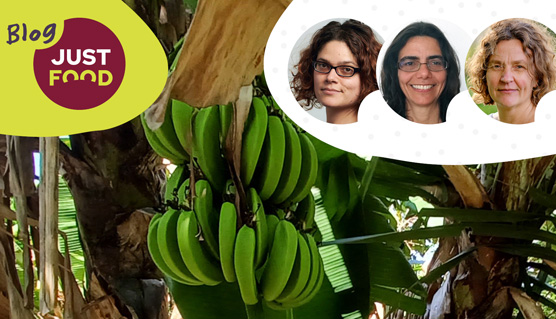
© Just food
When we climbed the little hill, it seemed almost like a green paradise. Agroforestry plantations around a hidden house, a fishpond and a vegetable garden. The urban agriculture project in the middle of one of the big favelas in Rio de Janeiro seems like a peaceful island in the middle of a chaotic accumulation of shacks, waste dumps, and horses and pigs seeking food in the streets.
The area is, however, not peaceful at all. Around twice a month, police raids take place fighting against drug gangs that control the favelas. In these shootings, uninvolved local residents are killed regularly by random bullets. The police are not squeamish in their raids, sometimes entering the favela when children walk home from school. In addition, private militias set up in the past years increasingly get involved in the violence.
“Everyone knows someone who was killed in these raids and mothers panic every time one starts, as they know that some innocent people could be hit.”
Ana tells us who lives in the little house together with her husband Marcelo. The two of them manage the agroecology project of CEM – Centro de Integração na Serra da Misericórdia (Integration Center in Serra da Misericórdia) – a small NGO that has been operating in the Penha favela complex, in Rio de Janeiro. CEM has been operating since 2011 and is supported by volunteer works and donations from partner organizations and participates actively in the Alliance for Agroecology, the Urban Agriculture Network, the Municipal Council for Food and Nutritional Security, among others.
Agroecology is strong in Brazil with a pronounced perspective on issues of justice and social inequality. It is promoted by numerous social movements and NGO’s, but has gained also government recognition. Since 2013, Brazil has had a National Plan for Agroecology and Organic Production to support a sustainable production of healthy food for the population. The federal government support was suspended between 2016 and 2022, by the far-right administration. It is now being resumed, but the federal support still does not reach small organizations like CEM.
The favelas in Rio are those places where the enormous inequality in the country manifests in violence. Residents live without regular water or power connections. Accordingly, water is one of the biggest problems for agroforests and agroecological productive backyards. Marcelo explains that in the dry and hot periods they need to irrigate the plants every day to keep them alive and productive. In the CEM project they built a cistern to store water and have a drip irrigation system to save water. Protecting the remaining Atlantic forest and the Serra da Misericórdia springs are part of CEM's environmental work.
Ana and her husband have achieved an enormous work. They have managed to transform four hectares of degraded land into a thriving agroecological agroforestry garden that supplies high quality and nutritious food for the CEM agroecological school’s children, who belong to the poorest and most vulnerable parts of society. The CEM also has an educational mission. The school children often come to the backyard and help planting and harvesting. The CEM agroecological school originally met once a week, but the children like it so much that they want to come every day after their regular school is finished. Besides agroecological planting techniques, children also have reinforcement of reading (with a small library), martial arts and capoeira classes (which help to contain violence) and learn about Africa, where many inhabitants of the favelas have their roots.
The project is well known in the favela and supported by the whole community including the drug gangs. Hoping for a life with less violence for their children, the parents are happy that there is an offer for meaningful activities after school.
We had a possibility to visit the CEM project in early October during our trip to Brazil, where we met our research partners from the Just food project. They collaborate at the Reference Centre for Food and Nutrition Sovereignty and Security, CERESAN, and are affiliated to the Federal Rural University of Rio de Janeiro and the Fluminense Federal University.
The CEM project is a cruel reminder of food insecurities in Brazil, but also a very powerful example of how to integrate social and environmental concerns in fighting for more just futures. Food insecurity has worsened in Brazil during the past years. Brazil had fallen off the hunger map after progressive administrations committed to food and nutritional security. But the pandemic, associated with a federal administration uncommitted to the human right to food, brought hunger back.
A survey carried out in 2022 indicated that 33 million people (15.5% of the population) suffered from severe food insecurity and another 15% from moderate insecurity. And food insecurity is greater among black people. Strengthening democratic structures and supporting capacities as done by the CEM are essential for better food security of these people. “Se tem racismo não tem agroecologia” (“If there is racism, there is no agroecology”).
Theresa Tribaldos, Rosângela P. Cintrão and Minna Kaljonen are researchers in the Just food project that studies ways to transition to a climate-smart and healthy food system in a sustainable, acceptable and just manner.
For more information about CEM Project:
Centro de Integração na Serra da Misericórdia (CEM)
For more information on agroecology, social inequalities and injustices in Brazil:
-
Maluf, R. S., Burlandy, L., Cintrão, R. P., Jomalinis, E., Santarelli, M., & Tribaldos, T. (2022). Global value chains, food and just transition: a multi-scale approach to Brazilian soy value chains. The Journal of Peasant Studies, 1-24.
-
Petersen, P., Mussoi, E.M., Dal Soglio, F. Institutionalization of the Agroecological Approach in Brazil: Advances and Challenges. Agroecology and Sustainable Food Systems. Volume 37, 2013 - Issue 1.Pages 103-114
-
Salles-Costa, R; Segall-Corrêa, A.M.; Alexandre-Weiss, V.P.; Pasquim, E.M; de Paula, N.M.; Lignani, J.B.; Del Grossi, M.E.; Zimmermann, S.A.; Medeiros, M.A.T.; Santos, M.C.; Maluf, R.S. Rise and fall of household food security in Brazil, 2004 to 2022 Perspectivas. Cad. Saúde Pública 39 (1) 2023.